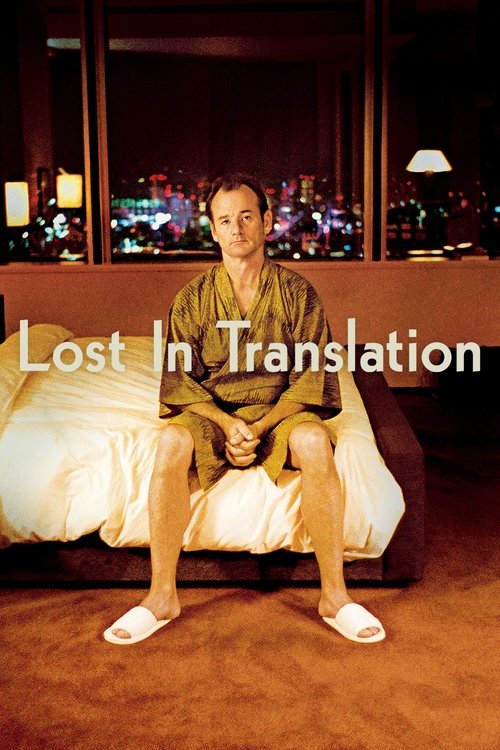
Title: Lost in Translation
Year: 2003
Director: Sofia Coppola
Writer: Sofia Coppola
Cast: Bill Murray (Bob Harris),
Scarlett Johansson (Charlotte),
Akiko Takeshita (Ms. Kawasaki),
Kazuyoshi Minamimagoe (Press Agent),
Kazuko Shibata (Press Agent),
Runtime: 102 min.
Synopsis: Two lost souls visiting Tokyo -- the young, neglected wife of a photographer and a washed-up movie star shooting a TV commercial -- find an odd solace and pensive freedom to be real in each other's company, away from their lives in America.
Rating: 7.385/10
A Poignant Exploration of Isolation, Connection, and the Transience of Human Experience
/10
Posted on June 6, 2025
Lost in Translation, directed by Sofia Coppola, is a cinematic masterpiece that delicately navigates the complexities of human connection, loneliness, and the search for meaning in an alienating world. With standout performances by Bill Murray and Scarlett Johansson, the film immerses viewers in a poignant tale of fleeting encounters, unspoken emotions, and the profound impact of shared experiences.
Coppola’s direction is a masterclass in subtlety and nuance, capturing the quiet beauty and melancholy of Tokyo’s bustling streets and neon-lit nights with a sense of reverence and longing. The film’s languid pace and contemplative tone mirror the emotional states of its protagonists, Bob and Charlotte, as they navigate the uncharted waters of midlife crisis and existential uncertainty. Coppola’s visual storytelling, characterized by intimate close-ups and evocative long takes, invites viewers to inhabit the inner worlds of her characters and empathize with their struggles, desires, and fears.
The screenplay, penned by Coppola herself, is a work of lyrical beauty and emotional depth that resonates with authenticity and vulnerability. The central premise of two lost souls finding solace and companionship in a foreign land serves as a poignant allegory for the universal human experience of alienation, longing, and the fleeting nature of connection. Coppola’s dialogue is sparse yet rich in subtext, allowing for moments of silence and nonverbal communication to convey the unspoken emotions and unfulfilled desires that bind Bob and Charlotte in a profound bond of understanding and empathy.
Murray’s performance as Bob Harris is a revelation, showcasing the actor’s versatility and emotional range in a role that is equal parts comedic and tragic. Murray imbues Bob with a world-weary charm and vulnerability that resonates with audiences on a deeply human level, capturing the character’s search for purpose and meaning in the twilight of his career and life. Johansson’s portrayal of Charlotte is equally captivating, embodying the restless spirit and quiet strength of a young woman adrift in a sea of uncertainty and unmet expectations. The chemistry between Murray and Johansson is palpable, infusing their interactions with a sense of intimacy and authenticity that elevates the film to a transcendent exploration of love, loss, and the transient nature of human connections.
The film’s cinematography, overseen by Lance Acord, is a visual feast that captures the sensory overload and cultural dissonance of Tokyo with a keen eye for detail and atmosphere. Acord’s use of vibrant colors, dynamic framing, and evocative compositions enhances the film’s mood and emotional resonance, creating a sense of place and mood that mirrors the internal landscapes of Bob and Charlotte. The film’s iconic shots of Tokyo’s bustling streets, serene temples, and neon-lit nightscapes serve as a backdrop for the characters’ emotional journeys, highlighting the juxtaposition of tradition and modernity, isolation and connection, that define their experiences.
While Lost in Translation is hailed as a modern classic of independent cinema, it is not without its flaws. Some critics have pointed out the film’s lack of narrative resolution and ambiguous ending as potential sources of frustration for viewers seeking a more definitive conclusion to Bob and Charlotte’s story. The film’s portrayal of cultural stereotypes and exoticism, while treated with sensitivity and nuance, may still perpetuate certain tropes and clichés about Japan and its people that could be seen as reductive or essentializing.
In conclusion, Lost in Translation stands as a poignant and profound meditation on the transient nature of human connections, the universality of loneliness, and the redemptive power of shared experiences that transcend language, culture, and time. Sofia Coppola’s sensitive direction, Bill Murray and Scarlett Johansson’s mesmerizing performances, and the film’s evocative visuals and haunting soundtrack combine to create a cinematic experience that is at once intimate, profound, and deeply moving. A modern masterpiece that invites viewers to ponder life’s big questions and existential uncertainties, Lost in Translation remains a timeless testament to the enduring power of cinema to capture the fleeting beauty and profound sadness of the human experience.
0
0
